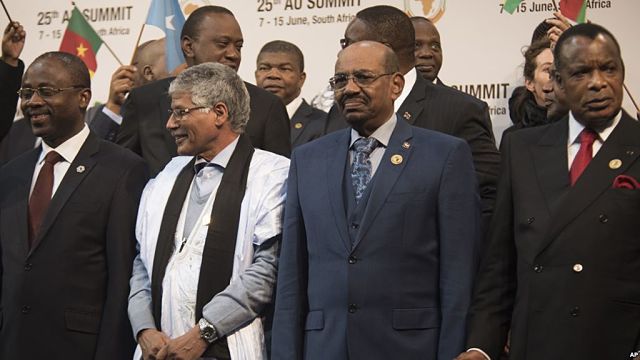 Sudanese president Omar al-Bashir, second from right, stands with other African leaders during a photo op at the AU summit in Johannesburg, June 14, 2015. (AP photo)
Sudanese president Omar al-Bashir, second from right, stands with other African leaders during a photo op at the AU summit in Johannesburg, June 14, 2015. (AP photo)
By James Butty and Chris Hannas
Last updated on: June 15, 2015
Sudanese President Omar al-Bashir flew home from South Africa Monday, defying a Pretoria court order to remain in the country until it decided whether he should be arrested on war crimes and genocide charges.
Bashir had been in Johannesburg for an African Union summit, but the International Criminal Court sought to compel his arrest while he was there. The ICC has charged him with genocide, war crimes and crimes against humanity for sending the army and backing Arab militias to put down an armed uprising in the Darfur conflict in 2003, but Mr. Bashir has long resisted the court’s authority.
Sudan’s official news agency said Bashir would hold a news conference at the Khartoum airport when he arrives there Monday night.
Before Bashir left South Africa, both the United Nations and the United States called for his arrest.
UN Secretary General Ban Ki-moon said, “The authority of the ICC must be respected and its decision implemented.”
Earlier Monday, Sudanese Information Minister Ahmed Bilal Osman told VOA that the president “is not a criminal” and attended the summit after getting assurances from South African President Zuma.
“We have very good relations with the government of South Africa,” Osman said. “We know that they are not going to arrest the president and nothing will happen.”
ICC criticism
Osman also criticized the ICC, which has active cases involving Sudan, Uganda, the Democratic Republic of Congo, the Central African Republic, Kenya, Libya and Ivory Coast.
“The ICC is a court practically directed toward punishment of the African leaders. A lot of crimes have been now committed around the world and these countries have gotten an immunity,” Osman said, specifically citing Israel and the United States.
U.S. Assistant Secretary of State for African Affairs Linda Thomas-Greenfield told VOA that for the United States, having Sudanese President Omar al-Bashir attend the AU summit was a “controversy.” But she added that it did not seem controversial to many of the Africans at the meeting.
Speaking on the sidelines of the summit in Johannesburg, Thomas-Greenfield said United States has supported efforts of the ICC, which issued a warrant for Bashir’s arrest. She added that the United States has encouraged African countries and other nations that are signatores to the ICC to turn him over for prosecution.
Late Sunday, State Department spokesman John Kirby said that while the U.S. is not a part of the International Criminal Court, it strongly supports efforts to hold accountable the perpetrators of genocide and war crimes.
“In light of the atrocities in Darfur, we call on the government of South Africa to support the international community’s efforts to provide justice for the victims of these heinous crimes,” Kirby said in a statement.
Caroline James, a lawyer from the Southern Africa Litigation Center that petitioned for the courts to force Bashir’s arrest, said many of the ICC’s cases came from requests by the nations involved.
“The other thing that is important to note is that although you can argue that the ICC is targeting African leaders, you can also argue that it is taking special efforts to ensure that African victims of human rights violations are given access to justice,” James said. “Because all of the situations in Africa that the ICC is investigating involve crimes committed against African citizens.”
The United Nations says fighting in the impoverished Darfur region has killed 300,000 people and created more than 2 million refugees. Most of the victims were civilians.
ICC President Sidiki Kaba said South Africa, which “has always contributed to the strengthening of the Court,” should “spare no effort in ensuring the execution of the arrest warrants.”
AU group photo
Despite calls for his arrest, Bashir took part in a group photo with other African leaders at the summit in Johannesburg on Sunday.
In a message posted on Twitter, South Africa’s ruling African National Congress party said it was calling upon the government to challenge the order against Bashir. It says immunity was granted to all participants of the summit as part of the international norms for countries hosting such gatherings.
Bashir was sworn in earlier this month for another five-year presidential term.
He promised to fight corruption, improve the economy and bring relations with the West back to what he calls their “natural state.”
He also vowed to bring peace to three separate regions where armed groups are fighting to topple his government — Blue Nile, Darfur and Kordofan. The president repeated his offer of total amnesty to any armed rebel who joins peace talks.
Bashir has ruled Sudan for 25 years. The country has not only been battered by armed rebellion, but by international sanctions and the loss of oil revenue when South Sudan gained independence.
—
Related:
Bid by Omar al-Bashir of Sudan to Avoid Arrest is Tested in South Africa (NY Times)
Join the conversation on Twitter and Facebook.

























